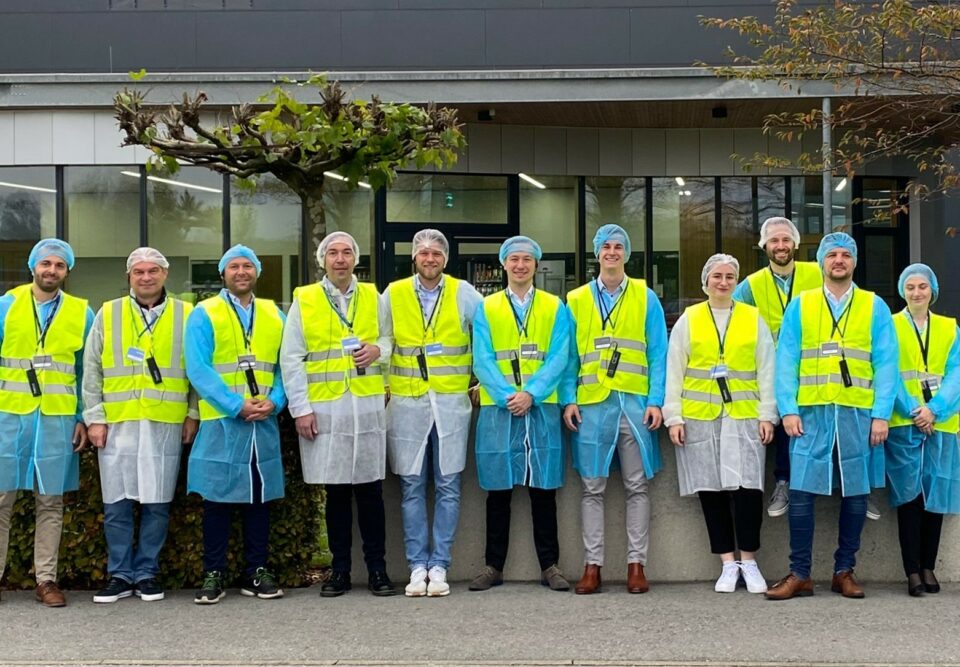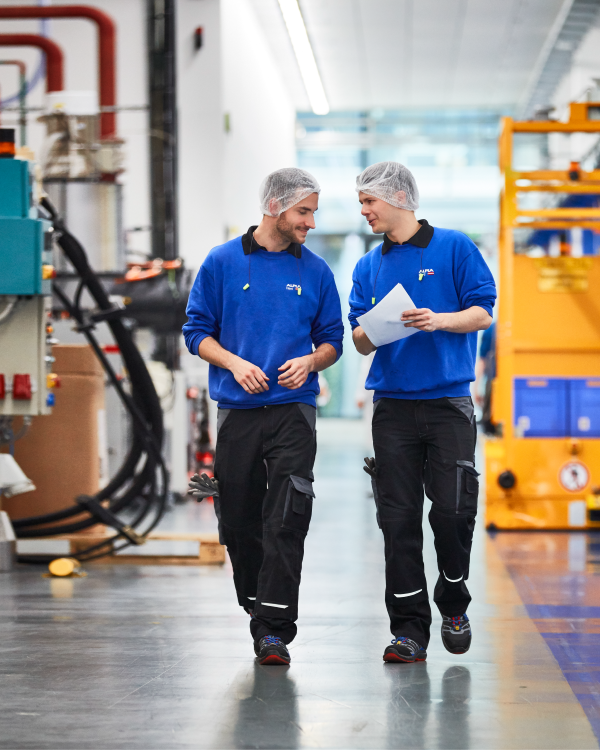At a glance
The Austrian ALPLA Group has an impressive company history: Over three generations, the family business has grown from an ambitious two-person operation into a global player in the packaging industry, generating nearly five billion euros annually with more than 23,000 employees. While ALPLA is still managed from the quaint town of Hard on Lake Constance, production is spread across almost 200 locations in 47 countries, offering a range of packaging systems, bottles, closures, and injection-molded parts.
As a result, the company also faces the challenges of operating worldwide. To remain competitive, consumption must be reduced and resources conserved. All production and logistics processes must be interconnected and continuously reviewed. The executives need to maintain an overview of all foreign plants using solid data from the headquarters in Hard.
Watch the full success story in the video:
Demand for Data Analysis rises sharply
A high-performance and high-quality reporting system is therefore essential for ALPLA’s success, as Matthäus Greber-Schaffgotsch, Head of IT, BI & AI CoE, confirms: “Our reporting is the virtual lubricant in our business processes. Wherever data is generated, we can enable faster and better decisions. More and more colleagues are discovering this. In recent years, requests from departments have increased massively. And, of course, data and insights should flow in real time wherever possible.”

An increasing number of ALPLA employees are using data to achieve their business goals. (ALPLA)
In fact, demand eventually became so high that both the company’s own data center and the requirement processes reached their capacity limits. “It became increasingly difficult for us to implement new topics for the departments with our old SQL-based data warehouse. At the same time, more and more changes and queries were piling up. And everything was only rudimentarily documented. Further investments simply wouldn’t have made sense.” Consequently, ALPLA decided on a complete fresh start with a modern data platform in the Azure Cloud.
Target vision: Self-service, centrally managed
Matthäus Greber-Schaffgotsch and his team already had clear objectives for the future solution: “We wanted to unify our reports and key figures across all source systems to provide a much higher level of quality and speed in gaining insights. It was particularly important for us to make working with data much simpler, enabling employees to conduct independent analyses.”
The goal was a “managed self-service” approach, where data ownership remains centralized within the BI team. “The creation of reports should largely be handed over to the departments. Meanwhile, we provide the consolidated datasets and act primarily as advisors.”
For ALPLA, this restructuring meant not only building an appropriate technological foundation in the cloud but also rethinking organizational structures around data usage. With these specifications in mind, the company began searching for a suitable partner to plan and implement the ambitious project.
Data Strategy Assessment provides technological foundation
Finding the right partner was more complex than initially expected: “Especially the high-performance consolidation and provision of our globally distributed data was a major challenge for the candidates,” explains Matthäus Greber-Schaffgotsch. “We also made a team size of 100+ consultants a basic requirement because it was clear we would need to scale repeatedly during the project.”
The decisive recommendation came from Microsoft. ORAYLIS GmbH, an experienced German service provider that had already successfully guided various large companies into the digital future, was brought on board. The project started with a so-called Data Strategy Assessment, which brought the different stakeholders together: “The BI team led the process, but representatives from the business were also involved, each bringing a specific case,” explains Simon Esser, Senior Project Manager at ORAYLIS.

Simon Esser, Senior Project Manager at ORAYLIS. (ORAYLIS)
“Together, we defined ALPLA’s strategic goals and the specific requirements for a solution. Based on these insights, a modern cloud data architecture was designed, tailored to the company’s needs. The focus was on flexibility, scalability, and easy integration of new data sources. The results were compiled into a strategy document for management, which also transparently outlined costs.”
“Better Together” – Data Platform with special features
The new ALPLA platform consolidates all globally distributed data sources in a central location. Essentially, it is a modern data lakehouse built on a proven combination of Azure services, including Data Factory and Storage Account. A key element is Databricks for data processing: “As practice shows, the combination of Microsoft and Databricks is the most economical and powerful way to unlock business data,” says Simon Esser. “We now refer to this as the ‘better-together principle.’”
Additionally, a special automation framework programmed by ORAYLIS is used. It simplifies development and enables central processing of all global data flows with only a 30-minute latency. It also ensures reliable description and provision of multilingual key figures. Power BI is integrated into every employee’s workspace, and its Excel-like interface makes it easy for users to start working with data. Extensive training is only needed in individual cases.

A strong team: ALPLA and ORAYLIS employees during a plant visit in Fussach. (ORAYLIS)
Financial reporting as a lighthouse project
During the Data Strategy Assessment, a business case from the finance department—a cash flow reporting system covering all subsidiaries and the headquarters—was implemented. The technical breakthrough impressed everyone: “In addition to internal data, external sources such as oil prices and exchange rates are also included,” says Andreas Weilguny, Business Analyst in Matthäus Greber-Schaffgotsch’s team. “Users can drill down to individual bookings and reliably forecast future scenarios. For example, it’s possible to simulate almost in real time how changes in oil prices would affect the company.”
Andreas Weilguny is also impressed by the system’s user-friendliness: “What previously had to be compiled manually from various Excel sheets is now available in seconds with Power BI. We save a huge amount of time and simultaneously provide more solid decision-making foundations.”
Developing the organizational target picture
After initial successes, the team focused on building the organizational structure around the new cloud platform. In a series of workshops, a data governance framework was developed with ORAYLIS experts to enable efficient company-wide work with data and guide future platform expansions. The managed self-service approach set the direction.
“It’s essentially a framework to implement the company’s data strategy and evolve it into a managed self-service approach,” explains ORAYLIS Project Manager Simon Esser. “In the workshops, responsibilities for governance and individual data sets were defined. Roles were clarified, and all data-driven processes—including their management, monitoring, and execution—were established. The necessary technologies were also selected.”
Data governance ensures that comprehensively available data can only be accessed and modified by authorized personnel. Guidelines were formulated in accordance with legal data protection regulations and internal compliance and are binding for both roles and processes.
Expanding the data offering
With company governance and a future-proof technological foundation, ALPLA can now drive its “digital growth” purposefully. Simon Esser emphasizes that these successes result from careful planning and leadership: “ALPLA basically did everything right, including having a decision-making Product Owner fully responsible for the topic and empowered by management. This made the project a success.”

Production is now fully connected to the new data platform. (ALPLA)
In addition to finance, the sales department now has fully modernized reporting, providing employees with detailed insights into customer behavior. All ALPLA plants worldwide are connected to the data platform. With the Operational Plant Manager Cockpit, plant managers can immediately gain an overview of production status. Incidents and quality issues are immediately visible and can be quickly addressed.
Executives in Hard also receive all relevant KPIs in a clear format, allowing one person to manage multiple sites factually and securely—even for short-term decisions. A real-time cockpit for production staff is planned to further optimize resources and workforce management.
More Opportunities for more employees
Matthäus Greber-Schaffgotsch is very satisfied with the current state of the digitalization initiative. He is particularly pleased that the backlog of reporting requests is a thing of the past: “With clear responsibilities, roles, and processes, we have created a transparent, future-proof structure. We have reduced incidents and improved responsiveness. Thanks to proper documentation, we can also provide departments with transparency at any time.”
Another key benefit is that far more employees now develop and modify reports independently. Matthäus Greber-Schaffgotsch aims to expand this benefit through the cloud platform: “We envision a centrally aligned data mesh, turning our platform into a global data hub. For example, our U.S. locations can access all datasets while complying with data protection. Users can also create, manage, and share their own data products.”
This next project phase is again planned and implemented in cooperation with ORAYLIS: “We are completely overhauling our global reporting, both technologically and organizationally. In a major project like this, you simply need a long-term partner who thinks strategically and whose judgment you can trust. We have now been working with ORAYLIS for three years and are more than satisfied with the results. We are looking forward to continuing this path of success together.”
Update 2025: Microsoft Visionary Award for ALPLA Project
In November 2025, ORAYLIS received the Visionary Award from Microsoft Austria in the Newcomer of the Year category for its work on the technological and organizational restructuring of the ALPLA data world. This award recognizes partners who are setting standards in digitalization and enabling forward-looking innovations.

turn your data into value.









